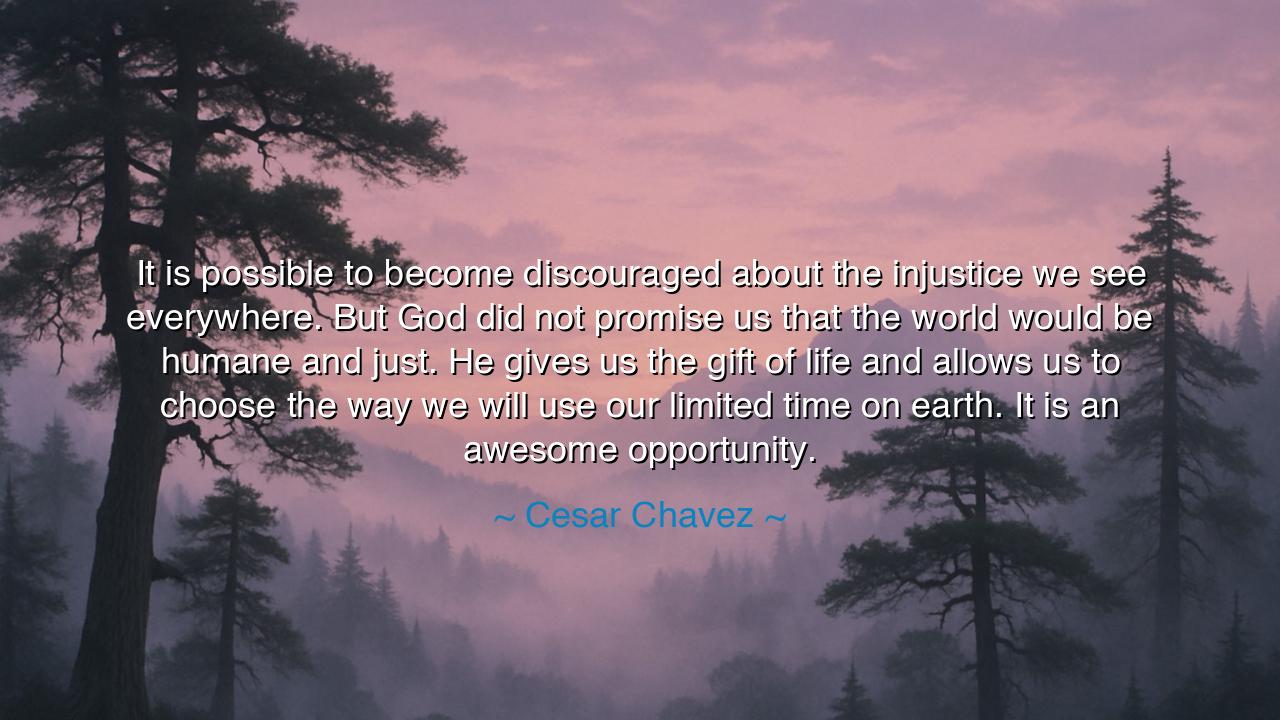
It is possible to become discouraged about the injustice we see
It is possible to become discouraged about the injustice we see everywhere. But God did not promise us that the world would be humane and just. He gives us the gift of life and allows us to choose the way we will use our limited time on earth. It is an awesome opportunity.






Cesar Chavez, the humble laborer who became a prophet of justice for farmworkers, once declared with deep solemnity: “It is possible to become discouraged about the injustice we see everywhere. But God did not promise us that the world would be humane and just. He gives us the gift of life and allows us to choose the way we will use our limited time on earth. It is an awesome opportunity.” These words strike with the weight of truth, for they recognize the brokenness of the world while also reminding us of the divine power of choice entrusted to every soul.
The meaning of this saying begins with acknowledgment: injustice is real, vast, and unyielding. The eyes of the righteous cannot turn in any direction without seeing oppression, cruelty, or exploitation. Yet Chavez warns against despair. For despair is a chain heavier than injustice itself, binding the spirit and silencing the will. God, he reminds us, never promised a life free of hardship, nor a world ruled by fairness. What He did grant is the greatest gift—the gift of life itself, and the freedom to choose what we will do with it.
The origin of Chavez’s words comes from his own battle. Born into hardship, he labored in the fields of California, bent beneath the sun, enduring the same cruelties he later rose to fight. As a leader of the United Farm Workers, he witnessed endless exploitation: men and women paid pennies, their voices silenced, their dignity stripped away. It would have been easy for him to surrender to despair, to believe that the cruelty of the world was final. But instead, he chose to see life as an opportunity—a chance to stand, to resist, to lead others toward dignity.
History shows us countless examples of this same truth. Consider Nelson Mandela, imprisoned for twenty-seven years by a government that despised his people. He could have allowed bitterness to consume him, but instead he chose to emerge from prison with forgiveness and vision, transforming his nation. Or think of Harriet Tubman, who escaped slavery but did not rest in freedom. She chose to return again and again, guiding others out of bondage, risking her life for those still enslaved. In both lives we see what Chavez declared: injustice may be overwhelming, but the gift of life grants us the freedom to act boldly.
The lesson is clear: do not waste your days cursing the darkness of the world. Acknowledge it, yes, but let it sharpen your resolve rather than dull your spirit. Your life is a flame, brief and precious. You may burn it in despair, or you may burn it in service, in love, in courage. To choose action over despair is to honor the gift of life itself. And though you may not see all injustice ended in your lifetime, you will leave behind sparks that others may carry forward.
Practical wisdom flows from these words. When you see injustice, ask not only, “Why does it exist?” but also, “What can I do in my time to answer it?” Perhaps your strength lies in advocacy, or in kindness to the oppressed, or in speaking truth where silence reigns. Use your talents, your energy, your days as sacred offerings. Even small acts, done with faith, are mighty in the eyes of time. Do not measure your worth by how vast the injustice remains, but by how faithfully you used your own opportunity to resist it.
Thus, Chavez’s words endure as a compass for all who struggle. “God did not promise us that the world would be humane and just.” Yet He did entrust us with the miracle of existence, with the freedom to act. Let us not squander it in bitterness or fear. Let us rise, even against impossible odds, knowing that our life is not merely survival, but an awesome opportunity to shape the world in ways large and small. And when our time is spent, may it be said of us that we chose well, and that we lived not in despair, but in the radiant strength of purpose.






AAdministratorAdministrator
Welcome, honored guests. Please leave a comment, we will respond soon